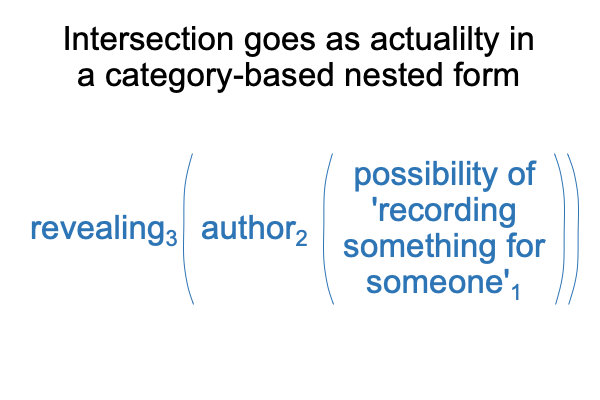0018 The author2, in prior blogs, is the single actuality composed of two actualities, insight2V and conditions2H. One cannot separate the two. They work in tandem. Insight2V emerges from the author’s charism1V, a divine gift. Condition2H situates the author’s scope1H, the cultural impress of the time, including literature that the author may have been exposed to.
The author2 is an actuality. This actuality2 is contextualized by the normal context3 of revealing3. This actuality emerges from the possibilities of ‘recording something for someone’1.
0019 The resulting nested form is:
Revealing3( author2 ( potential of ‘recording something for someone’1)

0020 On one hand, Genesis is not a secret document, so ‘something’ goes to all. On the other hand, for those who heard the oral tradition for millennia, ‘something’ is very personal. The early stories of Genesis are told to attentive children, by their mothers. These mothers know that their tradition is older than they can imagine. This is their charism. They are the ones who tell the stories of Adam and Eve, Cain and Abel, Lamech and the rest, generation through generation.
May I also say that they are the authors, so to speak?
0021 In chapter one, Mark Smith broadly speculates that Genesis 3 and Ezekiel 28 and 31 derive from the same source. Yet, there is, as Jacques Lacan puts it, “a petit objet A”, evidence that serves to inform the observer that there is a missing piece to a puzzle. The four rivers that flow into the Persian Gulf do not flow during Ezekiel’s time. They flow during the Wet Period of the Developed Neolithic of southwest Asia, five thousand years earlier. The four rivers in Genesis 3 are a petit objet A. They are in Genesis 3, yet are missing at the time when the redactor composes the scriptures. So, how does the redactor know about these four rivers?
Oh, there must be an oral tradition.
0022 Ahem. There is another observation that needs to be accounted for. Why does the bulk of the Old Testament, from Abraham through the prophets, not directly mention the stories of Adam and Eve? Why do they mention the seventh day as a day of rest, a theme of the Creation Story? Why is Genesis 3 ignored while the lessons of Genesis 1 are placed center stage?
Does it have anything to do with rotten men? The lessons of Genesis 1 are proclaimed by Moses. Not its companion, Genesis 3 and the like. Genesis 3 is told by the women of Israel to their children. Surely, Moses knows what the daughters of Israel tell their children, with unswerving dedication. Here is the source of the oral tradition that mentions the four rivers flowing into (or is it out of?) Eden.
0023 Here is my conclusion.
The sons of Israel are so busy constructing their world, according to their manly ways, that they do not imagine that these womanly stories about Adam and Eve have any… well… relevance to the issues at hand. When the bards of Israel put these fairy tales as the opening act, then… oh… the situation changes. Suddenly, Adam and Eve are legit.
0024 The bards of Israel?
The concept is implied in Smith’s speculative common source for Ezekiel 28 and Genesis 3. Who is the common source? Well, they are probably not members of the priestly class. Yet, their style is evident even in the days of Jesus. Jesus’ ministry is precisely what one expects for a bard of Israel. Jesus is totally traditional and miraculously entertaining. He recites the scriptures to all who come to listen.
0025 Still don’t imagine the bards of Israel?
The Greeks have the same schtick around the same time. Homer! He compiles the stories of the Greek bards. These stories, told in the Iron Age, detail the Bronze Age. Did I mention that the Bronze Age ends in some sort of catastrophe, hundreds of years prior to Homer?
0026 Still don’t grasp the bards of Israel?
Here, I jokingly shift my gaze to Hollywood, brimming with Jewish talent, sons of Abraham, rebels with Moses, kings like David and self-aggrandizers like Solomon. Where does all their verve come from? The bards of Israel got around.
